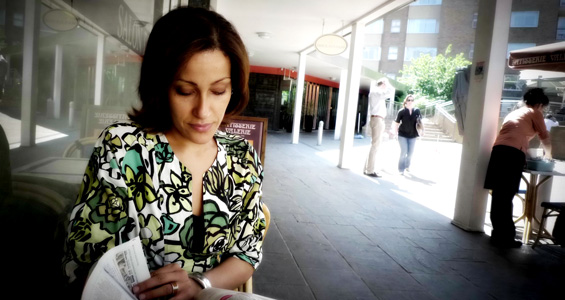Taking the banks on
Samah El-Shahat says big banks are brazen because they know the pressure is off.

 |
| Banks have been posting their quarterly profits – in the billions – much to the chagrin of taxpayers |
Samah El-Shahat, Al Jazeera’s resident economist, will be writing a regular column analysing key elements that have contributed to the global financial downturn and its impact across the world.
Keep reading
list of 4 itemsEcuador weighs security, international arbitration in latest referendum
‘Triple spending’: Zimbabweans bear cost of changing to new ZiG currency
Boeing hit with 32 whistleblower claims, as dead worker’s case reviewed
| Banks are feeding off home foreclosures |
I think the banks have pulled a fast one.
They might not have planned on it, but thinking back on it now, it appears they have come away with quite an amazing steal.
“The banks got an amazing deal last September, they were rescued by the taxpayer, and then re-floated themselves giving the taxpayer very little of the upside and now they are going to have very high profits and pay themselves bigger bonuses,” Simon Johnson recently said.
These aren’t the words of some leftist, radical economist, but the assessment of the former chief economist of the IMF who spoke out in the wake of multiple banks reporting and posting record profits last week.
The two banks whose bonus bonanzas rile me overwhelmingly are Goldman Sachs and Wells Fargo. Goldman Sachs was bailed out not once but twice.
The first time was then they were rescued as part of the AIG bailout, and the second time directly through the Troubled Asset Relief Program (TARP), which was established by Henry Paulson, the then-US treasury secretary, in 2008.
Insult to injury
| Read more columns |
 Money and power makes for a toxic bond Money and power makes for a toxic bond Why America is a bank-owned state Why America is a bank-owned state Banking time bombs Banking time bombs Greed and low wages Greed and low wages Bonuses are back Bonuses are back |
But what truly adds insult to injury, was seeing that Wells Fargo has recorded an 81 per cent jump in second quarter earnings. Despite these figures, however, Wells Fargo is still foreclosing on homes in places like Baltimore.
Just a year ago these banks were on the precipice, and the taxpayers saved them. Today, they are feeding off the same taxpayers.
This reminds me of the post-apocalyptic film and novel, Day of the Triffids, where plants were killing and feeding on the rotting carcasses of their victims.
Home foreclosures have hit four million in the US, and with the unemployment rate teetering toward 10 per cent, I say banks will be feasting off more soon.
And in the process they will kill the lynch-pin of the American dream – home ownership.
Palpable outrage
Why is it that our relationship with banks just seems to go one way – their way? Why does money seem to go from us to them, but never the other way around? Would this not be an excellent time for banks such as Wells Fargo to declare a house foreclosure moratorium?
I mean they were happy to take our money when they needed it, why can’t they do the same for us in our time of need – which in fact was in large part manufactured by the banking sector?
I do think there was a moment a few months ago, when we could have had more say and control over these masters of the universe. Where we could have demanded that they never foreclose on a single home again during this crisis.
Public outrage was so palpable, so menacing, that we could have brought them to heel – but we didn’t because we were lulled into believing that our governments knew what they were doing and could handle this situation.
What dawned on us later, when it was way too late, was that our governments were in the pockets of these very banks. Economists like to politely call that “cognitive capture” (see Willem Buiter at the Financial Times for an excellent analysis of this).
Bubble-bursting
| COUNTING THE COST | |||
|
That tipping point to reform the banks by public outcry has now come and gone. Governments have burst that bubble of anger willingly and purposefully.
Note how the governments are willing to burst this bubble, but wouldn’t act before to burst any of the bubbles that got us into this mess in the first place – such as the property bubble, or any other speculative bubble.
Moreover, both banks and the government kept luring us into believing that the green shoots of recovery were always on the horizon. They never took the time though to tell us that these blossoming green shoots will only occur in the financial world, and not in our world.
Banks also went out of their way, even when they were in serious financial trouble, to make sure that real reform was kept at bay – by investing in lobbying.
Bank of America Corp., which received $45 billion in federal rescue aid, spent $800,000 in the April-June quarter, up from $660,000 in the first quarter.
The tally was down from nearly $1.2 million in the year-ago period, the Public Interest Research Group says.
Morgan Stanley’s lobbying costs jumped to $830,000 from $540,000 in the first three months of the year, and $690,000 in the second quarter of 2008, according to the Public Interest Research Group.
“While these companies continue to count their taxpayer cash, they’re using their lobbying against critical financial reform,” said Ed Mierzwinski, tbe consumer programme director at Public Interest Research Group.
“Anywhere but Washington, you would think this was the Saturday morning cartoons,” he added.
Bonus bonanzas
Banks – like those triffids – are survivors, they have sensed that their moment of reckoning has passed. That is why they are unashamedly exposing their bonus bonanzas, their bling to us with such provocative zeal.
They believe that we are too overdosed on our sorry fates that we can’t mount a counter attack.
Yet banks shouldn’t underestimate our anger or what we can do. This is because what happens to the US, what happens to the UK, and everywhere else will be shaped by whether we take the banks on ourselves.
Our fates will be shaped by us – the consumers and taxpayers.
I met with Gillian Tett, the assistant editor of the Financial Times, and she used the analogy of the frog and the boiling water to explain public reaction to the crisis, and whether we really would take the bankers on.
What’s boiling?
She spoke of a war that is being waged between us and the banker, and I have to say I agree. So what has the frog and boiling water got to do with it? Paul Krugman explains the boiling frog in a recent article in The New York Times.
If you take a proverbial frog and put it in a pot of cold water that is gradually heated, it never realises the danger it is in and is boiled alive. But if you place a real frog in boiling water straight away it will jump out of the pot.
I know the fallout from the recession is creeping up on us gradually – unemployment, house foreclosures, future spending cuts, etc. This is similar to gradually heating water.
But this shouldn’t in any way desensitise us to the fact that things are only going to get worse for real street. And we really have to marshal our voices to demand real reform of the banking sector that benefits us the people.
This boiling water is real.
I am ready to jump – how about you?
Samah El-Shahat also presents Al Jazeera’s People & Power programme.
The views expressed in the above column are the author’s own and do not necessarily reflect Al Jazeera’s editorial policy.
